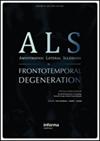肌萎缩侧索硬化症患者经皮内镜胃造口术后生存的营养预后因素
IF 2.8
4区 医学
Q2 CLINICAL NEUROLOGY
Amyotrophic Lateral Sclerosis and Frontotemporal Degeneration
Pub Date : 2019-07-26
DOI:10.1080/21678421.2019.1643374
引用次数: 11
摘要
摘要目的:关于影响肌萎缩侧索硬化症(ALS)患者经皮内镜胃造瘘术(PEG)后生存率的营养因素,存在相互矛盾的数据。我们进行了一项观察性横断面研究,评估了身体质量指数(BMI)类别和胆固醇水平作为PEG后生存的预后因素。此外,我们评估了一组患者的身体成分,以更好地解释BMI对生存率的影响。方法:对连续47例患者进行PEG植入时的神经和营养参数评估。此外,通过生物电阻抗分析对22名患者的亚组进行了身体成分评估。存活率计算为从放置PEG到死亡的时间。结果:使用Cox回归分析[HR,与正常体重患者相比,体重不足患者的死亡风险显著增加 = 3.37(1.29–8.81);p = 0.04]。同样,出现症状时年龄较大会显著增加死亡风险[HR = 1.07(1.02–1.12);p = 超重/肥胖和高胆固醇血症均不影响生存率。与普通人群相比,所有ALS患者的身体组成都发生了变化。此外,BMI<18.5 kg/m2确定的患者与以正常BMI作为参考值的患者相比,体细胞质量(BCM)和相位角(PhA)显著降低。结论:在疾病的后期,只有BMI < 18.5 kg/m2和症状出现时年龄较大对生存率具有预后价值。血脂异常不影响生存率。体重不足患者的低BCM和PhA特征支持BMI作为生存预测指标的作用。本文章由计算机程序翻译,如有差异,请以英文原文为准。
Nutritional prognostic factors for survival in amyotrophic lateral sclerosis patients undergone percutaneous endoscopic gastrostomy placement
Abstract Objective: There are conflicting data on nutritional factors influencing survival in amyotrophic lateral sclerosis (ALS) patients after percutaneous endoscopic gastrostomy (PEG) placement. We performed an observational cross-sectional study evaluating body mass index (BMI) categories and cholesterol levels as prognostic factors for survival after PEG. Moreover, we assessed body composition in a subgroup of patients to better explain the influence of BMI on survival. Methods: Neurological and nutritional parameters were evaluated at the time of PEG implantation in 47 consecutive patients. Moreover, body composition was evaluated in a subgroup of 22 patients by bioelectrical impedance analysis. Survival was calculated as the time from the PEG placement to death. Results: Underweight patients had a significantly increased risk of death as compared to normal-weight patients using Cox regression analysis [HR = 3.37 (1.29–8.81); p = 0.04]. Similarly, older age at the onset of symptoms significantly increased the risk of death [HR = 1.07 (1.02–1.12); p = 0.001]. Neither overweight/obesity nor hypercholesterolemia affected survival. All ALS patients showed an altered body composition compared to the general population. In addition, a BMI <18.5 kg/m2 identified patients with a significant reduction of body cell mass (BCM) and phase angle (PhA) compared to patients with normal BMI taken as the reference value. Conclusions: In the later stages of the disease, only a BMI < 18.5 kg/m2 and older age at symptom onset had a prognostic value on survival. Dyslipidemia did not affect survival. The low BCM and PhA characterizing underweight patients support the role of BMI as a predictor of survival.
求助全文
通过发布文献求助,成功后即可免费获取论文全文。
去求助
来源期刊

Amyotrophic Lateral Sclerosis and Frontotemporal Degeneration
CLINICAL NEUROLOGY-
CiteScore
5.40
自引率
10.70%
发文量
64
期刊介绍:
Amyotrophic Lateral Sclerosis and Frontotemporal Degeneration is an exciting new initiative. It represents a timely expansion of the journal Amyotrophic Lateral Sclerosis in response to the clinical, imaging pathological and genetic overlap between ALS and frontotemporal dementia. The expanded journal provides outstanding coverage of research in a wide range of issues related to motor neuron diseases, especially ALS (Lou Gehrig’s disease) and cognitive decline associated with frontotemporal degeneration. The journal also covers related disorders of the neuroaxis when relevant to these core conditions.
 求助内容:
求助内容: 应助结果提醒方式:
应助结果提醒方式:


